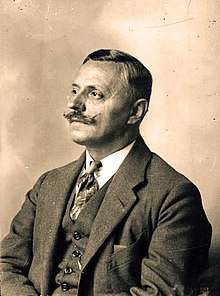Gjergj Pekmezi
Gjergj Pekmezi (23 April 1872 – 24 February 1938) was an Albanian linguist, philosopher, folklorist and diplomat. In 1916, he became a member of the Literary Commission of Shkodër, which established the first standard form of the Albanian language.
Gjergj Pekmezi | |
|---|---|
 Gjergj Pekmezi portrait | |
| Born | 23 April 1872 Tushemisht, Vilayet of Monastir, Ottoman Empire |
| Died | 24 February 1938 (aged 65) |
| Other names | Georg Pekmezi |
| Occupation | Philologist, diplomat |
| Known for | Albanian Literary Commission |
Early life
Pekmezi was born in Tushemisht, Pogradec (modern day Albania). He began his initial studies in Ohrid and Monastir, moving on to Belgrade from 1890–1894. He later graduated from the University of Vienna in philosophy and philology in 1898. After his graduation, Pekmezi returned to Albania.
Career
In 1903, Pekmezi was elected to direct the Albanian language cathedra at the Oriental University of Vienna.[1] He founded the cultural-patriotic society Dija (Knowledge) in 1904 with Hile Mosi, Kolë Rrota and other Albanian intellectuals. In the late Ottoman period, Austria-Hungary subsidized two of Pekmezi's works: Albanesische Bibliographie and Albanianische Grammatik.[2]
During the autumn of 1913, Pekmezi worked for the border commission in southern Albania and in March 1914 was appointed dragoman (interpreter/secretary) at the new Austro–Hungarian mission in Durrës. In 1916, he was a leading member of the Albanian Literary Commission in Shkodër under the auspices of Austro–Hungary. In April 1917 he accompanied and facilitated the delegation of Albanian chieftains and leaders who visited Vienna and met with the Imperial authorities with an invitation by Ignaz Freiherr Trollmann.[3]
From 1920 to 1924 and 1926 to 1928, he served as Albanian consul in Austria. In 1924 he published a new edition of Thimi Mitko's Bleta Shqipëtare using the modern Albanian alphabet.[4] Pekmezi's work became at that time the best-known edition of Bleta Shqipëtare.
From 1928 until his death, he taught Albanian at the University of Vienna.[5] The Albanology branch of the University of Vienna bears his name.[6]
A high school located in Rruga Driloni, Pogradec, Albania is named Gjergj Pekmezi High School.[7]
Work
Gjergj Pekmezi was the author of:[5]
- Vorläufiger Bericht über das Studium des albanesischen Dialekts von Elbasan (Preliminary Report on the Study of the Albanian Dialect of Elbasan), Vienna, 1901
- Grammatik der albanesischen Sprache (Grammar of the Albanian Language), Vienna, 1908
- Bleta shqypëtare e Thimi Mitkos (The Albanian Bee of Thimi Mitko), Vienna, 1924
- Bibliographija shqype/Albanesische Bibliographie (Albanian Bibliography), as coauthor, Vienna, 1909
- Sprachführer zur schnellen Erlernung der albanischen Sprache (Manual for Learning the Albanian Language Quickly), Vienna, 1913
- Lehr und Lesebuch des Albanischen (Manual and Reader of Albanian), as coauthor with Maximilian Lambertz, Vienna, 1913
Sources
Notes
- Skendi 1967, p. 261.
- Skendi, Stavro (1967). The Albanian national awakening. Princeton: Princeton University Press. p. 277. ISBN 9781400847761.CS1 maint: ref=harv (link)
- Prijësit shqiptarë në Vjenën e 1917 Fotot dhe portretet fisnike [Albanian leaders in Vienna of 1917 Noble photos and portraits] (in Albanian), shqiptarja.com (Rilindasi Supplement), 2013-05-13, retrieved 2014-02-15
- Marcel Cornis-Pope 2007, p. 355.
- Elsie 2010, p. 351.
- Gjergj Pekmezi, ndër intelektualët më të kulturuar të kohës [Gjergj Pekmezi, among the most educated intellectuals of his time] (in Albanian), Gazeta Telegraf, retrieved 2014-02-15
- "High School Students from Pogradec Meet America | U.S. Embassy in Albania". U.S. Embassy in Albania. 2016-06-15. Retrieved 2018-11-12.
References
- Cornis-Pope, Marcel; Neubauer, John (2007-07-15). History of the literary cultures of East-Central Europe: junctures and disjunctures in the 19th and 20th centuries. John Benjamin's Publishing Company. ISBN 978-90-272-3455-1. Retrieved 18 May 2011.
- Elsie, Robert (2010). Historical Dictionary of Albania. Historical Dictionaries of Europe. 75 (2 ed.). Scarecrow Press. ISBN 978-0810861886.